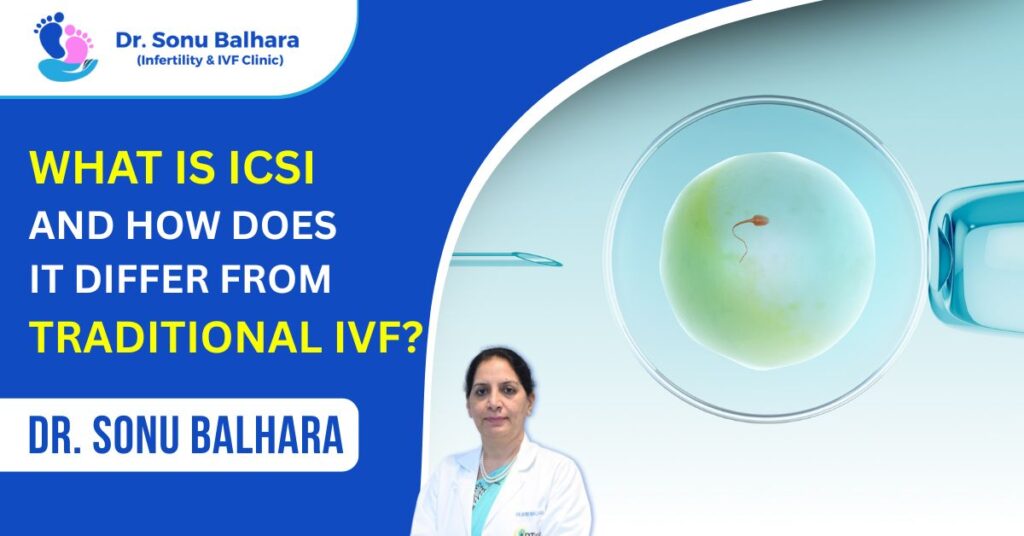Infertility can be one of the most emotional and challenging journeys a couple faces. Thanks to modern reproductive medicine, however, medical advances like IVF (In Vitro Fertilization) and ICSI (Intracytoplasmic Sperm Injection) have made parenthood possible for millions.
Although both methods share the same goal — fertilizing an egg outside the body — they differ in how that fertilization happens.
Let’s understand the difference in simple terms.
What Is ICSI?
ICSI, short for Intracytoplasmic Sperm Injection, is an advanced version of the IVF technique.
In a standard IVF procedure, thousands of sperm are placed around each egg in a laboratory dish, allowing one sperm to naturally penetrate the egg on its own.
In ICSI, however, scientists take a single healthy sperm and inject it directly into the cytoplasm of the egg using a very fine needle under a powerful microscope.
This precise method bypasses natural fertilization barriers — ensuring fertilization even when sperm quality is poor or sperm count is extremely low.
Step-by-Step: How ICSI Works
1. Ovarian Stimulation:
The female partner is given fertility medications to produce multiple mature eggs.
2. Egg Retrieval:
The eggs are collected from the ovaries using a minor surgical procedure.
3. Sperm Collection:
Sperm are obtained from the male partner — either through ejaculation or minor surgical extraction (in case of very low sperm count).
4. Sperm Injection (ICSI Step):
A single, healthy sperm is selected and directly injected into each mature egg using a microneedle.
5. Fertilization Check:
After 16–18 hours, embryologists check whether the eggs have been successfully fertilized.
6. Embryo Transfer:
The best-quality embryos are transferred into the uterus to initiate pregnancy.
How ICSI Differs from Traditional IVF
| Aspect | Traditional IVF |
ICSI (Intracytoplasmic Sperm Injection) |
| Fertilization Method | Thousands of sperm are placed around each egg; fertilization occurs naturally. | A single sperm is directly injected into the egg using a microneedle. |
| Use Case | Used when sperm count and motility are normal. | Ideal when sperm count, motility, or morphology is poor. |
| Sperm Requirement | Requires many active, healthy sperm. | Requires only a few sperm, even a single viable one per egg. |
| Success Rate | Around 60–70% fertilization rate (depending on sperm quality). | Up to 80–90% fertilization rate in male infertility cases. |
| Lab Technique | Less technologically intensive. | Highly advanced, requires specialized equipment and expertise. |
When Is ICSI Recommended?
Doctors usually recommend ICSI in the following situations:
- Very low sperm count or poor sperm motility
- Abnormal sperm morphology (shape or structure issues)
- Previous IVF failure due to poor fertilization
- Obstructive azoospermia, where sperm can’t reach semen
- When sperm are retrieved directly from the testes or epididymis
- Cases of unexplained infertility
Benefits of ICSI
- Increases fertilization rates in severe male infertility cases
- Requires fewer sperm for successful conception
- Can be used with frozen sperm or surgically retrieved sperm
- Reduces the risk of failed fertilization
- Offers hope to couples with previous IVF failures
Possible Risks and Considerations
While ICSI has a high success rate, it’s not without limitations:
- Slightly higher cost than traditional IVF
- May increase the chance of fertilization errors (though rare)
- Limited evidence of slightly increased genetic or chromosomal risks (especially when male infertility is severe)
- Not every fertilized egg develops into a healthy embryo
Conclusion
Both IVF and ICSI are remarkable scientific breakthroughs that have redefined fertility treatment.
While IVF mimics the natural fertilization process, ICSI provides a precise solution for male infertility, giving couples renewed hope when conventional methods fail.
If you’re considering fertility treatment, consult a qualified reproductive specialist. They can guide you toward the right approach based on your medical history, test results, and emotional readiness.
Remember, every fertility journey is unique — and science today is giving families a new chance at life every single day.

